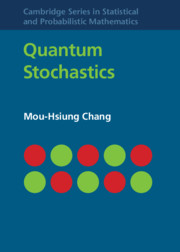Book contents
- Frontmatter
- Dedication
- Contents
- Preface
- Introduction and Summary
- 1 Operator Algebras and Topologies
- 2 Quantum Probability
- 3 Quantum Stochastic Calculus
- 4 Quantum Stochastic Differential Equations
- 5 Quantum Markov Semigroups
- 6 Minimal QDS
- 7 Quantum Markov Processes
- 8 Strong Quantum Markov Processes
- 9 Invariant Normal States
- 10 Recurrence and Transience
- 11 Ergodic Theory
- Bibliography
- Index
10 - Recurrence and Transience
Published online by Cambridge University Press: 05 February 2015
- Frontmatter
- Dedication
- Contents
- Preface
- Introduction and Summary
- 1 Operator Algebras and Topologies
- 2 Quantum Probability
- 3 Quantum Stochastic Calculus
- 4 Quantum Stochastic Differential Equations
- 5 Quantum Markov Semigroups
- 6 Minimal QDS
- 7 Quantum Markov Processes
- 8 Strong Quantum Markov Processes
- 9 Invariant Normal States
- 10 Recurrence and Transience
- 11 Ergodic Theory
- Bibliography
- Index
Summary
In this chapter we explore concepts and properties of recurrence and transience that are 2 of the 3 important asymptotic behaviors of quantum Markov semigroups, namely, recurrence, transience, and ergodicity. Ergodic theory is the subject of interest in Chapter 11.
Transience and recurrence come to a probabilist mind as the first step in the classification of Markov processes. In classical probability, these 2 notions have been extensively studied in connection with Semigroup and Potential Theory (see Getoor [Get80]). Although the large time behavior of quantum Markov semigroups has been the subject of a number of investigations (see Frigerio [Fri77], [Fri78] and Frigerio and Verri [FV82]), a detailed study of recurrence and transience is still in its infancy in comparison with the development of its classical counterpart. Some recent works such as those of Rebolledo [Reb97], Fanola and Rebolledo [FR02a], [FR02b], [FR03b], Umanita [Uma05], [Uma06], and Gartner and Kummerer [GK12] aim at filling that gap. In particular, [FR02b] and [F03] introduce the concept of transience and recurrence for quantum Markov semigroups and explores its main properties via the associated potential. It is shown that an irreducible quantum Markov semigroup is either recurrent or transient, and they characterize transient semigroups by means of the existence of nontrivial superhaimonic operators.
In the noncommutative framework, quantum Markov semigroups arise as a natural extension of the classical notion. Moreover, they are a fundamental tool in the noncommutative version of the theory due to both: the nonexistence of trajectories and the difficulties in handling a good notion of stopping time.
The material presented in this chapter is based on the works of Fagnola and Rebolledo [FR02a], [FR02b], [FR03], Umanita [Uma05], [Uma06], Haag [Haa02], and Gartner and Kummerer [GK12]. Different notion of recurrence and transience have also been studied, for example, in Accardi and Koroliuk [AK91], Mohari [Moh05], Raggio and Zangara [RZ11], and Grunbaum et al.
- Type
- Chapter
- Information
- Quantum Stochastics , pp. 334 - 371Publisher: Cambridge University PressPrint publication year: 2015



